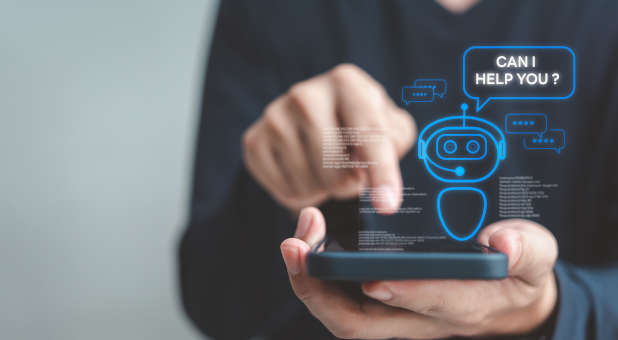Here’s How Christians Are Affected by A.I. Everyday (Hint: It’s a Lot)
People today are aware of the presence of artificial intelligence (AI) in society, but many fewer are aware of how frequently they interact and are impacted by this new technological wonder.
With so little knowledge and understanding of AI among the general populace, there are many who want nothing to do with it, yet use it daily.
For many Christians, there is a biblical distrust of AI tied into the belief that it will be utilized in some fashion to usher in the reign of The Beast during the end of days.
With digital forms of commerce, banking and energy consumption giving outside agencies greater control over an individual’s personal life, the growing cause for concern among many may well be justified.
Here are ways that Christians are affected everyday by AI (and the list keeps growing):
- Facial and Voice recognition
This is perhaps the most common form of AI that hundreds of millions of people around the world use consistently throughout the day.
If you have a modern smartphone, the odds are it has a facial recognition feature that uses an AI algorithm to plot out and save your facial image to unlock your phone.
Utilizing features such as voice-to-text and security options on smart devices recognizes and runs the users voice through an AI-based algorithm that recognizes and learns the users’ vocal tones and queues.
- Smart assistants
If you talk to Amazon’s Alexa or Apple’s Siri to help you locate your lost Air Pods or to play music throughout your house, then you are using AI
Smart assistants are rapidly becoming integrated into every aspect of a person’s life including in home devices, smart phones and vehicles.
- Robotics
When the image of robotics comes to mind, a manufacturing plant assembling vehicles is a common image to have. But smart robotics can be found in homes throughout the world.
One of the most common forms of smart robotics is the wildly popular Roomba.
From cleaning cat hair off the floor to assembly of the newest Tesla model electric car or even your new smart oven that can be set and cook meals with little human interaction, AI robotics is fast becoming the norm of the manufacturing industry instead of a futuristic outlier.
- Search engines
If there is a gatekeeper to the internet it would be the modern-day search engine, especially Google.
While there are those who look for more private search engines such as Bing and DuckDuckGo, Google is king, and all of the major players in the search engine game run queries through AI technology.
This allows the engines to learn what you like, what you search for, what to recommend based on a person’s preferences and search history.
Almost every major tech company is now employing AI chatbots to help in this regard. OpenAI has the revolutionary ChatGPT, Microsoft’s Bing and CoPilot use a chatbot based off this technology, while Google has its own in-house AI chatbot Bard, and IBM has reintroduced a moder version of their old Watson AI: WatsonX.
- Navigation
AI is helping guide millions of people a day, whether they realize it or not.
From navigation systems in cars, to ride-share companies like Uber and Lyft, AI technology is being used by nav systems to optimize, and track, the travel patterns of people across the world.
Smartphones come with free applications such as Google or Apple maps that utilize this same technology to help drivers avoid congested areas, plan family trips and optimize routes based on an individual’s preference, such as avoiding toll roads or highways to get to a destination.
While human air traffic controllers are still the brains behind the enormous task of routing and coordinating flights around the world, the future plans are for AI to coordinate with pilots offering real-time information in a fraction of the time it takes its human counterpart. This includes automatically updated weather patterns, potential hazards to a flight and continuous updates to flight plans to prevent collisions and flight backlogs.
- Finance
Perhaps the area most people who distrust AI are most concerned with.
AI is being used throughout the financial sector due to the unmatched capability of processing high volumes of quantitative data, it’s ability to report real-time market changes and its impeccable accuracy.
As reported by Built In, the financial industry “takes note of AI’s efficiency and accuracy, it is rapidly implementing automation, chatbots, adaptive intelligence, anti-fraud defenses, algorithmic trading and machine learning into financial processes.”
Taxes, mortgage processing, cryptocurrency, stock market predictions, investing, transactions, trading and portfolio management are all falling under the influence and control of AI technology.
With interest by large banks, corporations and governments to implement a central bank digital currency (CBDC), AI would undoubtedly be used to monitor, deposit and withdrawal the digitized currency.
The great fear with this lies in the potential for abuse and the ability to shut-down account holders for whatever reason the bank may deem necessary.
Not to mention the very real fear for many Christians that this digital and centralized currency would pave the way for the economic systems of The Beast and lead to the implementation of the Mark of the Beast, which will be required for the purchasing or selling of goods and services.
- Social media
The world of social media has been turned on its head in recent months.
With Elon Musk’s purchase of Twitter and the revelations of shadow-banning, censorship and out-right removal from the platform, many are becoming more aware of the role AI is playing on every single social media platform in use today.
If you use social media at all, you are interacting with AI
Twitter, Facebook, Snapchat, Instagram, even Slack, all utilize AI to monitor content, gather user information and patterns, suggest content, photo tagging and ad targeting.
These platforms, dominantly used on mobile devices, are instituting new methods of image recognition as well.
The worry for many is the censorship that comes with using social media.
With the exposure of Twitter’s past sins in the “Twitter Files” series released by independent journalists working with Elon Musk, people now know that groups like Meta have social and political agendas while silencing voices that do not align with those goals.
- Retail
Have you ever been browsing the internet for a particular item and noticed it just so happens to show up randomly on various websites?
That is AI at work in the digital marketplace.
A person’s buying habits are processed in the hopes of establishing an economic relationship with the user and deliver a friendly experience thus driving up sales and creating a repeat-customer.
It’s not just clothing or technology companies that are monitoring your purchases and building a database on your likes and spending patterns.
Food outlets such as Whole Foods Market monitor every item a person adds or removes from their digital shopping cart while building a “virtual shopping cart” based on an AI’s understanding of your purchasing patterns.
- Marketing
The mass communication of marketing campaigns that A.I can handle these days has marketing firms increasingly investing in the technology to reach a maximum number of potential clients as possible.
Being able to organize and compile massive amounts of customer data while targeting specific audiences and demographics has become an essential tool for marketing teams around the world.
AI is streamlining marketing work by organizing meetings for the various team members, assisting customers, updating contact information and much more.
This has led to hyper-optimized ad placement for the firm’s customer base, and inundating potential clients with level of commercialization never experienced before.
- Healthcare
The entire healthcare industry is undergoing a makeover process with the introduction of AI technologies into the field.
Advanced technologies are now assisting doctors with surgery, diagnosing ailments, organizing and safeguarding patients records and reducing time spent in hospitals for patients with the advent of the virtual online assistant.
Pharmaceutical companies are cashing in on the research capabilities of AI as well. It allows researchers to develop medicines much faster than in years prior, along with reducing the cost of the research to develop new drugs.
That savings has yet to make its way to the customer however.
All this and much more highlight the ways that Christians are interacting with AI and may not even have a clue about it.
While many have an understandable distrust of the technology, and the potential repercussions associated with it, it is becoming more and more difficult to avoid in the average American citizens life.
Perhaps, that is the goal behind the AI boom.
Look for Part 2 of this Special Report coming soon, including Glenn Beck’s video warning Christians to tread carefully with AI. {eoa}
James Lasher is Staff Writer for Charisma Media.







































